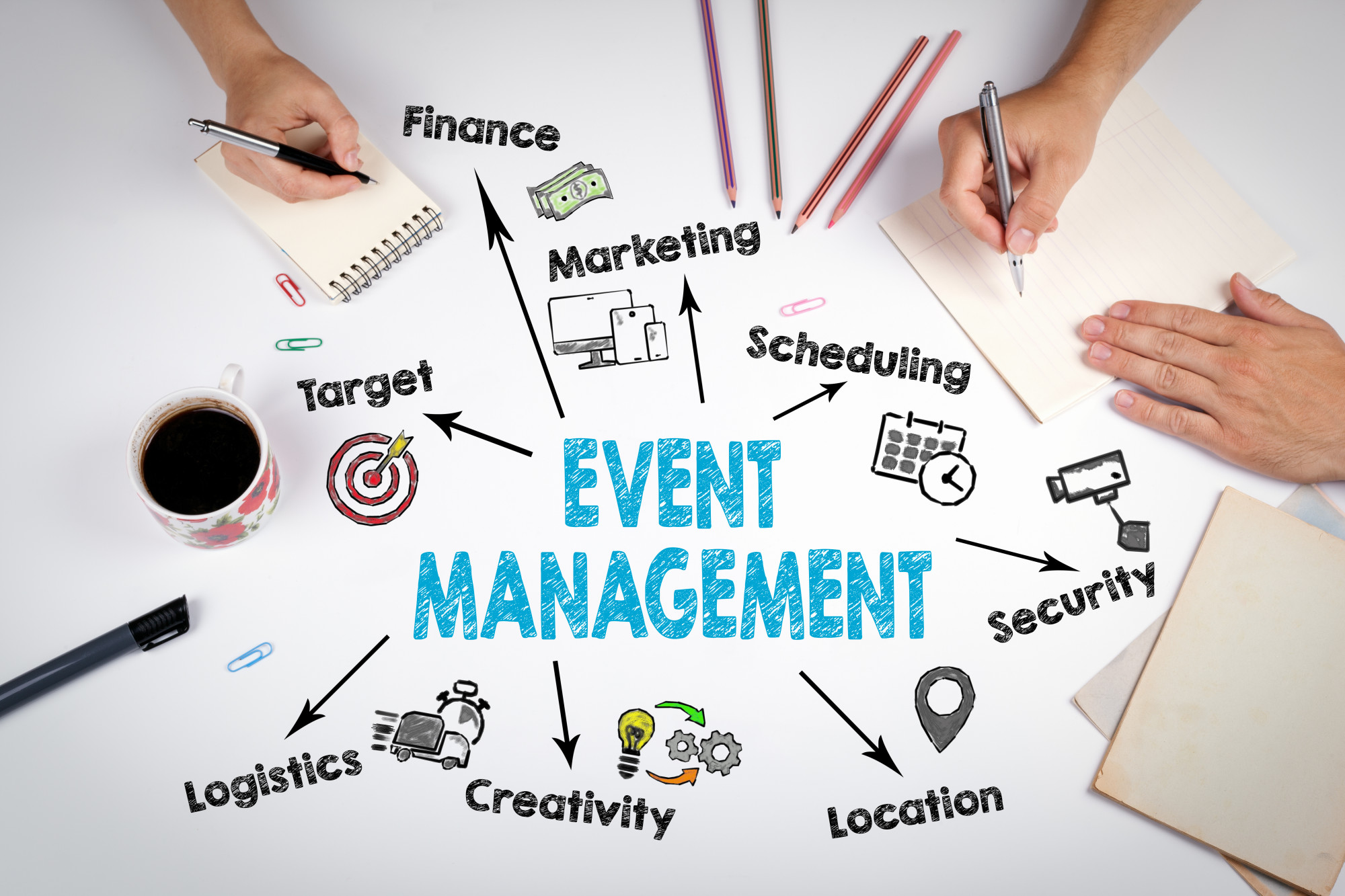Why charlotte event companies are preferred by top corporations
Wiki Article
A Deep Study Exactly How Event Management Works to Create Unforgettable Experiences
Event management is an intricate discipline that incorporates various components to craft unforgettable experiences. It calls for a clear understanding of the event's purpose and target market. Coordinators have to navigate budgeting, logistics, and advertising and marketing to guarantee a smooth implementation. Each part plays an important function in accomplishing the wanted effect. Nonetheless, the journey does not finish with the event itself. There are insights to discover that can shape future endeavors.The Principles of Event Management
Reliable event management incorporates a variety of essential principles that assist the planning and implementation of successful events. At its core, it entails understanding the event's purpose, audience, and desired results. Recognizing the target demographic is vital, as it educates choices related to content, advertising and marketing, and logistics.Budgeting is an additional basic aspect, assuring that resources are allocated efficiently while fulfilling the event's purposes. This includes planning for unanticipated expenditures that might arise.
Time management plays an essential function, as event managers should develop a detailed timeline to coordinate different jobs and milestones.
Additionally, effective communication amongst stakeholders, suppliers, and team participants is vital to guarantee alignment and stay clear of misconceptions.
Threat management need to be thought about, with contingency strategies in area to resolve prospective challenges, thereby boosting the general experience for attendees and assuring a seamless implementation of the event.
Secret Roles in Event Preparation
In event planning, understanding crucial roles is essential for effective execution. The event organizer is in charge of managing logistics and ensuring all elements straighten with the vision. In addition, effective supplier management is important for maintaining top quality and cultivating solid collaborations throughout the preparation process.Event Organizer Obligations
An event organizer manages the intricate aspects of event preparation, making certain smooth execution from conception to final thought. They are liable for conceiving the event theme, setting spending plans, and creating timelines to keep the task on course. Control with stakeholders, including customers, location supervisors, and volunteers, is important to align assumptions and promote interaction. The coordinator additionally oversees logistics, such as food catering, transportation, and innovation needs, guaranteeing all parts function harmoniously. They perform website check outs, manage timetables, and troubleshoot concerns that might develop during the event. Post-event, the planner reviews the event's success, gathering responses and evaluating end results to educate future jobs. This diverse function requires solid organizational abilities, interest to information, and effective interpersonal interaction.Supplier Management Basics
Guiding with the landscape of supplier management is crucial for successful event planning. Effective vendor management includes determining, picking, and collaborating vendors that give important solutions, such as catering, audiovisual assistance, and decor. Event planners need to preserve solid interaction with suppliers to assure that all elements line up with the event's vision. Key duties consist of the supplier supervisor, who oversees contracts and negotiations, and the logistics coordinator, responsible for on-site configuration and execution. It's crucial to establish clear expectations and timelines, promoting a collaborative setting that improves the overall experience. By focusing on these elements, event planners can navigate potential challenges, ensuring that every information adds to a smooth and remarkable event.Crafting a Vision: Principle Development

As soon as a vision is established, it becomes necessary to convert it into workable elements. This check that consists of specifying the ambience, picking proper venues, and identifying the event's design. Working together with stakeholders, consisting of sponsors and companions, further refines the idea, making sure that all parties share a linked understanding of the event's function. Inevitably, a strong vision not only enhances participant engagement yet likewise establishes the phase for remarkable experiences that resonate long after the event concludes.
Budgeting and Source Allowance
With a clear vision in position, the following action in event management involves careful budgeting and resource appropriation. This critical stage guarantees that all needed parts are funded and lined up with the event's purposes. Event managers begin by estimating costs associated with venue choice, food catering, enjoyment, and advertising. They develop an in-depth budget plan that details each classification, enabling transparency and accountability.Source appropriation expands beyond finances; it also incorporates personnels. Determining team duties, duties, and timelines is vital to guarantee performance. Event managers should additionally take into consideration contingencies for unforeseen expenditures or adjustments in range, developing a buffer within the spending plan.
Prioritizing costs on elements that improve guest experiences is critical. By tactically designating resources, event supervisors optimize effect while preserving financial control. This disciplined approach not only fosters effective events yet likewise builds integrity and trust with stakeholders and participants.
Logistics: The Foundation of Event Execution
While budgeting prepares for an occasion, logistics work as its foundation, assuring that every aspect is implemented smoothly and efficiently. charlotte event companies. This encompasses a variety of activities, including location choice, transport setups, and equipment purchase. Effective logistics management requires thorough preparation and sychronisation to assure that all components line up with the event's timeline and goalsKey elements of logistics consist of inventory management, where materials and products are tracked to avoid shortages, and staffing, which involves recruiting and training workers to take care of various tasks. Interaction is likewise important, as it assists in partnership among suppliers, sponsors, and the event group.

Marketing and Promo Techniques
Efficient marketing and promo techniques are vital for making the most of attendance and interaction at an event, as they generate passion and exhilaration among prospective participants. Event managers employ a mix of conventional and digital advertising methods to reach their target audience. Social network platforms, email campaigns, and targeted advertisements are typically used to produce buzz and foster neighborhood interaction. Partnerships with influencers or news sector leaders can enhance reputation, while involving content such as video clips and reviews can reverberate with prospective guests.Additionally, leveraging event-specific hashtags and developing shareable graphics encourages organic promotion amongst attendees. Early riser ticket deals and unique promos can incentivize registration, furthermore boosting interest. Moreover, a properly designed web site that offers easy navigation and clear info regarding the event can improve the customer experience. By executing these marketing and promo strategies, event supervisors can guarantee greater exposure and eventually produce a remarkable experience for all individuals.

Gauging Success: Responses and Analysis
Success in event management rests on durable feedback and assessment devices. These processes are necessary for establishing the efficiency of an occasion and recognizing areas for renovation. By collecting input from attendees, coordinators can examine fulfillment levels, recognize choices, and gauge total effect. Studies and meetings act as useful tools for accumulating measurable and qualitative data, permitting thorough evaluation.Additionally, examining vital efficiency indications (KPIs) such as attendance rates, interaction degrees, and roi (ROI) provides a more clear image of event success. Post-event debriefing sessions with the planning group additionally add understandings, promoting a culture of continual renovation.
Inevitably, a systematic approach to feedback and assessment not just improves future occasions yet additionally reinforces partnerships with stakeholders. By executing these techniques, event supervisors can produce memorable experiences that resonate with individuals and drive recurring involvement.
Frequently Asked Questions
Exactly How Do Event Supervisors Manage Unanticipated Challenges Throughout an Occasion?
Event managers deal with unforeseen difficulties by continuing to be calm, reviewing the scenario, and executing backup plans - charlotte event companies. They interact efficiently with their team, adjust rapidly, and focus on services her response to assure the event proceeds smoothly and effectivelyWhat Modern Technology Devices Are Necessary for Modern Event Management?
Vital technology tools for modern-day event management include event registration software program, job management applications, attendee involvement platforms, and analytics devices. These resources simplify procedures, improve interaction, and enhance general event experiences for coordinators and participants alike.Just How Do Cultural Differences Influence Event Preparation and Execution?
Social differences considerably influence event preparation and implementation. They affect styles, personalizeds, communication designs, and assumptions, requiring customized strategies to assure inclusivity and respect, inevitably shaping the overall experience and success of the event.What Are the Moral Considerations in Event Management?
Moral factors to consider in event management incorporate openness, sustainability, social level of sensitivity, and inclusivity. Organizers should focus on justness, regard varied audiences, minimize environmental effect, and assurance ease of access to develop liable and unforgettable experiences for all individuals.Exactly How Can Sustainability Be Integrated Into Event Planning?
Sustainability can be incorporated right into event planning by utilizing environmentally friendly products, lessening waste, sourcing neighborhood vendors, carrying out carbon countered programs, and advertising electronic options to lower paper usage, consequently boosting ecological awareness within the event's framework.Report this wiki page